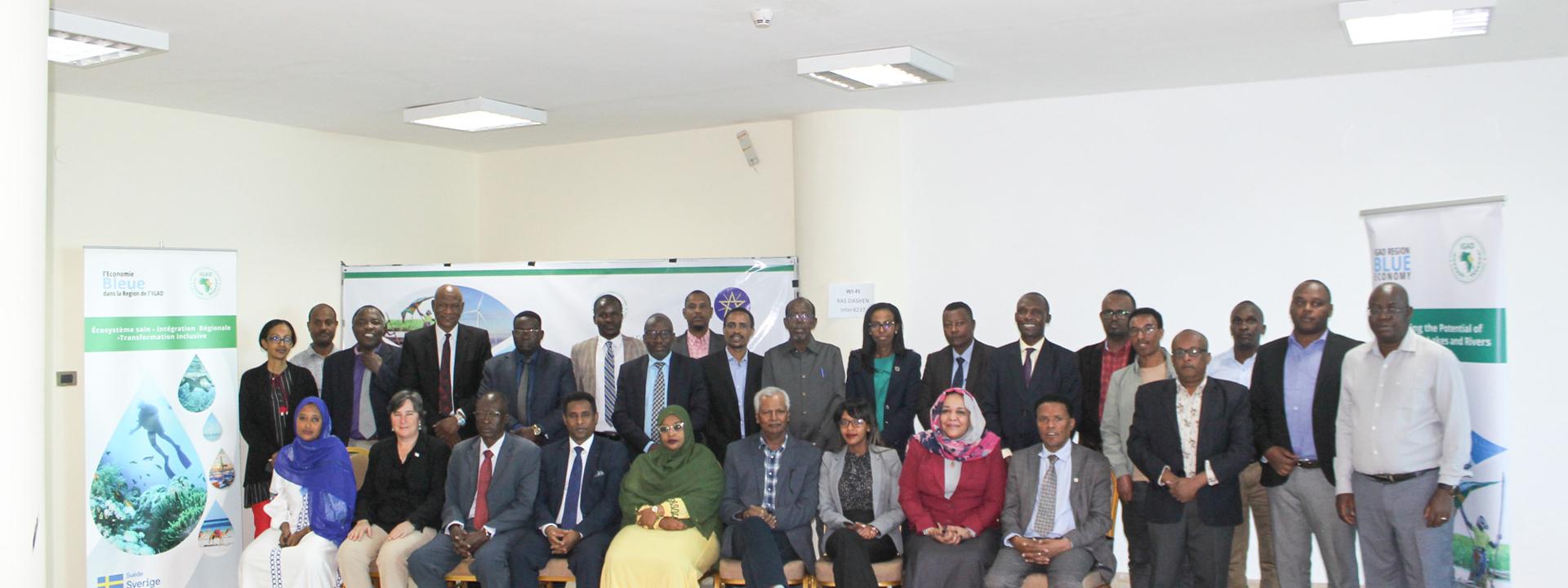December 1, 2022 (ADDIS ABABA, Ethiopia): The Intergovernmental Authority on Development (IGAD) held a three-day Training on Coordination Mechanisms, Policy Instruments/Enabling Environments for Blue Economy (BE) Governance and to Integrate BE in National Development Plans in the IGAD Members States on November 28-30 in Addis Ababa.
Representatives from IGAD Member States’ Ministries of Environment; Ministries of Transport and Logistic; Ministries of Fisheries, Marine Resources, and Livestock; Ministries of Finance and Planning; Ministries of Water and Environment, and Blue Economy attended the training.
In his opening speech delivered on Day 1 on behalf of the IGAD Executive Secretary, Dr. Eshete Dejen, of IGAD Agriculture and Environment Division said: “I want to stress that Blue Economy and Biodiversity are on the top priority of IGAD and this is reflected well in the new IGAD Regional Corporate Strategy 2021-2025. I would like to assure you that IGAD is committed to provide all the necessary support for the sustainable utilization of the Blue Economy potentials for the socio-economic development of the region.”
Captain Getenet Abay, the Chief Executive Officer for the Maritime Administration at the Maritime Authority of Ethiopia stated: “I applaud IGAD’s immense support through this journey. Besides supporting us with the development of the national blue economy strategies, the need for establishing suitable institutional arrangements for planning, coordinating, and overseeing the implementation of those strategies as well as for reviewing and monitoring their progress and achievements is well understood. I believe that blue economy coordination requires transformation of institutional structures, governance models, and regulatory frameworks. The training surely addresses these matters in depth. I also hope that our respective national blue economy strategies will be a revolutionary guide for our future cooperation, coordination, and blue governance.”
The objectives of the training were:
- to share lessons to propose national BE coordination mechanisms in the draft national BE strategy for each IGAD Member State;
- to assess an enabling tool (financing, capacity, partnerships and innovations) and management component that establishes and oversees the tools and mechanisms needed to manage;
- to coordinate and implement BE strategies and interventions;
- and to provide training to integrate BE in the national development plans.
The training is organized as part of the “Enhancing Blue Economy in the IGAD Member States for Biodiversity Conservations and Livelihood Diversification” signed by IGAD and financially supported by the Government of Sweden.
Background
Blue Economy (BE) strategy is one that brings together relevant sectors operating in the ocean and inland water spaces and harnesses their economic and strategic priorities into common goals and objectives, while also reconciling those economic and growth objectives with the needs and imperatives of environmental and social sustainability. Functional BE coordination requires a profound transformation of institutional structures and governance models. Besides developing a BE policy and strategic plan, countries and regions must establish suitable institutional arrangements for devising, coordinating and overseeing the implementation of those plans and strategies as well as for reviewing and monitoring their progress and achievements.

